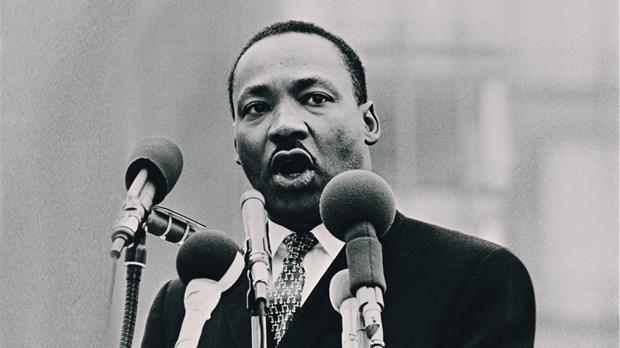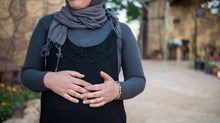I Disappointed Martin Luther King

I don’t know if you saw me, but I was in Selma. I was nothing more than an extra in the background of a single scene—a girl with brown hair, neatly pinned back in curls, running around in a fitted dress with matching cap, two friends giggling at my side. The shot isn’t very long—just a slow, easy pan—but I’m there.
You can see David Oyelowo, who plays the Reverend Dr. Martin Luther King, Jr., leading the group of thousands of people across a bridge on the first leg of his march to Montgomery. While the rows and rows of protesters pass me, I stand with my friends, eyes big as I watch this spectacle unfold. Even from my face you can tell I’m conflicted. My eyes are asking, What are you doing? But my mind is wondering, What does it matter?
So my friends and I clutch our purses a little tighter as we take another lingering look, and then we walk in the other direction. Away from the protesters. Away from the march. Away from change. Away from justice.
More than Tears
I must confess that over the past few years I have been gravely disappointed with the white moderate. . . who is more devoted to "order" than to justice; who prefers a negative peace which is the absence of tension to a positive peace which is the presence of justice. . . . Shallow understanding from people of good will is more frustrating than absolute misunderstanding from people of ill will. Lukewarm acceptance is much more bewildering than outright rejection.
In his famous Letter from a Birmingham Jail penned in 1963, King wrote these words to millions of American citizens who could, by day, watch the civil rights activists be beaten, and then, by night, sleep soundly in their own beds. He wrote these words for the pastors who were preaching grace from the pulpit and yet enforcing segregation in their congregations. He was writing this letter to me, and many years later, as I sit digesting Selma and finding fault in my own fight for justice, his words find their mark.
While I didn’t actually make my acting debut in one of this year’s most thoughtful and necessary films, I certainly identified with the girl in the back of that frame. I, too, have that same curiosity—but I, too, have looked with my eyes toward justice while running with my feet toward protecting the status quo. I am Shallow Understandings and Lukewarm Acceptance. I am the problem.
But how is that possible? I love the Lord, so much. I weep over the tragedies I see around me—over our broken foster care system that leaves the very orphans we’re mandated to protect abused and neglected. Over the four women who are raped every five minutes in a country where little is done on their behalf. Over refugees in Sudan who are experiencing the very real struggle of modern slavery as they are sold into trafficking organizations around the world.
I may weep for these things, but my tears alone do little good.
“Yes, I see the church as the body of Christ," King wrote, "But, oh! How we have blemished and scarred that body through social neglect and through fear of being nonconformists.” Indeed, the body is bruised. We are blemished and broken. We are hurting each other, even still, more than 50 years after King's letter was written. Every day that the most some of us do is cry for justice, we are only adding salt to those marring wounds. My own tears are easily shed, and justice is far too costly to be bought so cheaply.
Answering God's Call
“Evil men don’t understand justice, but those who follow the Lord understand completely” (). God calls the church to be the ultimate champion of justice—yet instead are we countless pews of people who are uncomfortable with the very idea of change? We should be on the front lines of this justice-march every single time, and instead many of us are putting in our tithe and pulling out the pot-roast just in time for the Sunday football games.
I’m left to wonder: How much longer will apathy fuel us? How much longer will we neglect justice?
“Injustice anywhere is a threat to justice everywhere," King taught. And in this moment, I feel overwhelmed with the injustice in the world. Famines. Wars. Crises. Deficits. Death. Corrupt governments. Corrupt laws. Corrupt people. I feel suffocated by the burdens of the world, all the while my back is cushioned by my white moderate mindset.
As I see myself in Selma, a spectator, and therefore—as King diagnoses—a contributor to the problem, I am ashamed.
But hear me when I say that I am also changed.
I am beginning to understand that our innate search and longing for justice is reflective of God himself, as “the LORD loves righteousness and justice” (Psalm 33:5). Martin Luther King’s influence, his legacy, this movie, even the current protests are evidence of this imprint of God on our very souls.
We want justice. We crave it. We need it. We are hungry for it.
And God only encourages this desire. Through Isaiah, God challenged his people: “Learn to do right! Seek justice, encourage the oppressed. Defend the cause of the fatherless, plead the case of the widow” (Isaiah 1:17). From the prophet Zechariah we read, “This is what the Lord Almighty says: 'Administer true justice; show mercy and compassion to one another’” (Zechariah 7:9). Through Micah we learn that the call resonate: “He has showed you, O man, what is good. And what does the Lord require of you? To act justly and to love mercy and to walk humbly with your God” (Micah 6:8).
Perhaps John Piper says it best in his response to Selma:
When I think about the needs and sorrows and injustices of the world (thousands of peoples perishing unreached by the gospel, millions of babies killed in their mothers’ wombs, global slavery and human trafficking, ethnic and racial hatreds around the world,) the thought of an easy, comfortable, secure life of coasting to the end, feels overwhelmingly unattractive to me. So I pray that this story of courage and sacrifice and conflicted righteousness will stir you and me to an unwavering commitment not to waste our lives.
Where injustice exists in our world today, may we all be active partners in the struggle for freedom. May we all sacrifice our comfort, our resources, our pride, our time, our friends, our tears, and our distractions for the sake of biblical justice. May that same resonance of God that spurs us to seek justice ring so loudly in us that all we can do or think or say is to offer our best interpretation of the hope, of the purpose, of the drive that is in us.
At the end of the day, I hope my fight for justice leads me to be an extra yet again, this time in the crowd of thousands, marching my way to Montgomery.
Image by Dick DeMarsico, World Telegram staff photographer, via Wikimedia Commons.
Read more articles that highlight writing by Christian women at ChristianityToday.com/Women
 Read These Next
Read These Next

 The Wonder Women of SyriaThe story of refugees overcoming the devastating effects of war
The Wonder Women of SyriaThe story of refugees overcoming the devastating effects of war
 5 Ways to Become a Better Mom TodayIt’s time to get your mom joy back.
5 Ways to Become a Better Mom TodayIt’s time to get your mom joy back.








 Homepage
Homepage
